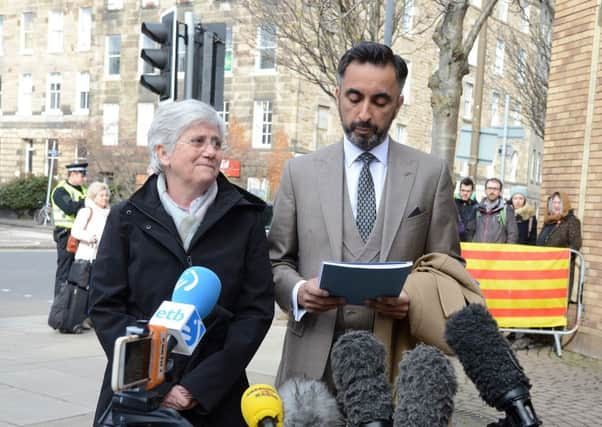Tom Peterkin: Ponsati is an unlikely rebel but a problem for Sturgeon


Politics has a habit of throwing up the unexpected. In recent weeks there have been few sights more incongruous than that of an academic of a certain age handing herself into a Scottish police station to face charges of “violent rebellion and misappropriation of public funds” brought by a foreign government. Professor Clara Ponsati of St Andrews University doesn’t exactly have the look of a rebel.
Perhaps that contributed to the surreal atmosphere surrounding her arrival at St Leonard’s police station in Edinburgh and her subsequent appearance at the capital’s Sheriff Court.
Advertisement
Hide AdAdvertisement
Hide AdBut for Professor Ponsati the extradition attempt brought by the Spanish authorities via a European Arrest Warrant must feel very real indeed. If found guilty, the academic could face a jail sentence of up to 30 years.
The many people who have been following this case know the allegations made by Madrid are unrelated to Professor Ponsati’s former position as head of economics and finance at St Andrews.
It is her other role as the Catalan education minister and her part in last year’s hugely controversial referendum that saw Catalonian separatists attempt to split from Spain.
As the record crowd-funding effort that has so far raised hundreds of thousands of pounds for the professor’s fight against extradition shows, there is a huge well of public sympathy for her in Scotland.
That sympathy is easy to understand. As her lawyer Amar Anwar put it, she believes she is a victim of political persecution. Moreover she does not think her human rights can be guaranteed in Spain.
Scottish observers of the constitutional battle between Barcelona and Madrid find it difficult to comprehend why the Catalonians should be denied the right to self-determination.
Understanding the internal politics of Spain can be more difficult when you come from a country where a perfectly legal independence referendum was staged in 2014 with the co-operation of the UK Government.
Given the enthusiasm with which many Yes voters expressed solidarity with Catalonian independence supporters, the plight of the professor has, in particular, become a touchstone issue for grassroots Scottish Yessers.
Advertisement
Hide AdAdvertisement
Hide AdFor many of a Yes persuasion, solidarity with Catalan separatists far outweighs the Spanish Government’s stance that holding a referendum was illegal and is contrary to the 1978 Spanish constitution.
Arguments that she was working to separate Catalonia from the rest of Spain against the wishes of the Spanish citizens hold no truck with those who feel outraged that a region with a pro-independence majority in its parliament is unable to hold a legitimate referendum.
But for leading SNP figures in positions of responsibility, it is a more nuanced issue than many within the Scottish Yes movement would have you believe. As a life-long advocate of Scottish self-determination, Nicola Sturgeon’s instinct must be to support Professor Ponsati in her battle with the Spanish authorities.
But as First Minister of Scotland, she knows that European Arrest Warrants must be dealt with through the appropriate legal channels.
Hence the carefully crafted nature of any pronouncement she has made on the matter.
“I know that many will wish that @scotgov was able to do or say more – I understand that,” the First Minister said on Twitter at the time. “But I hope there can also be an understanding of the position as outlined and the importance of protecting due process and the independence of our legal system.”
In a single tweet, she managed to express the idea that she sympathises with Professor Ponsati while explaining that her hands are tied.
Ms Sturgeon is only too aware that she cannot interfere with the judicial system. To do so would be absolutely taboo, even if it leads to indignation and frustration from her supporters.
Advertisement
Hide AdAdvertisement
Hide AdAs others have pointed out, there is a glaring inconsistency in the stance of those who demand judicial interference from Ms Sturgeon while complaining that Professor Ponsati is the victim of what they believe to be a politically motivated extradition order.
So now Professor Ponsati’s fates lies in the hands of the Scottish courts as they decide on the European Arrest Warrant.
Some have suggested that the Spanish bid will fail on the grounds of “dual criminality” - the requirement that the crime that Professor Ponsati is accused of actually existing in the jurisdiction that she was arrested. In this case, there is no crime of “rebellion” in Scotland. Others say “dual criminality” can be overcome when the countries in question are both members of the EU. Whatever decision is arrived at will have a knock-on effect for Ms Sturgeon. Should Professor Ponsati find herself on the way back to Spain, there will be an outcry from Ms Sturgeon’s supporters.
Should the academic stay here, Ms Sturgeon will have to face the wrath of the Spanish establishment – an outcome that will only cement Spanish resistance to any attempt by the First Minister to keep Scotland within the EU.
But whatever the implications are for the SNP leader, they are tiny in comparison to the impact that the forthcoming legal wrangling will have on a certain Fife-based academic who finds herself in the midst of all this as a result of her political beliefs.
